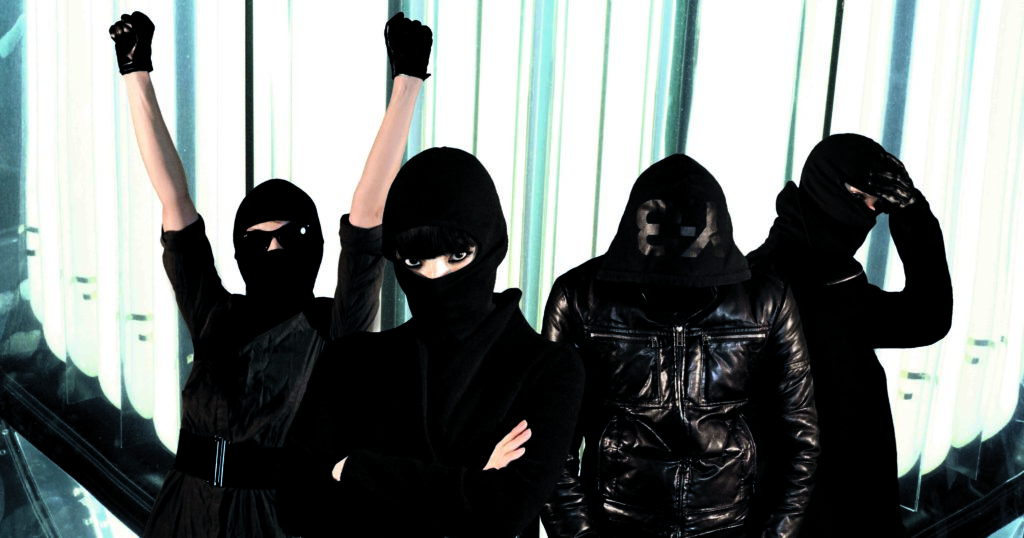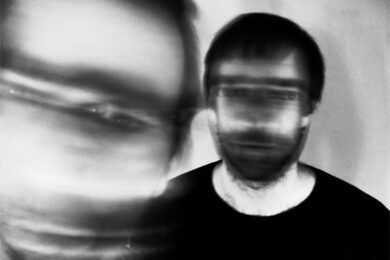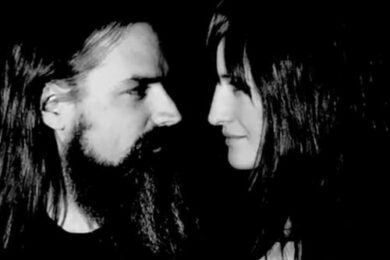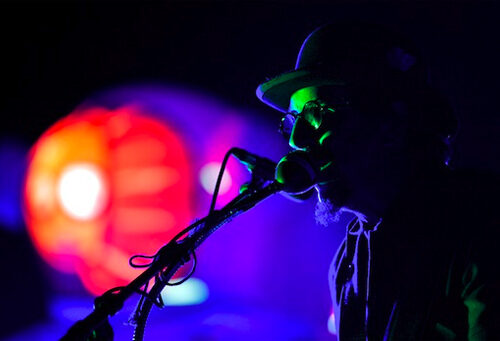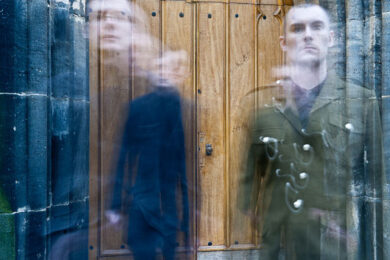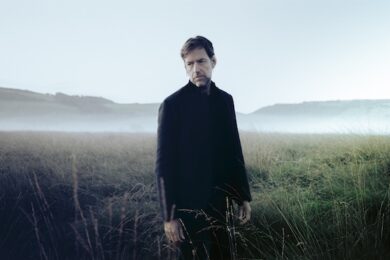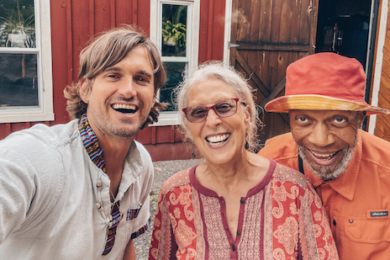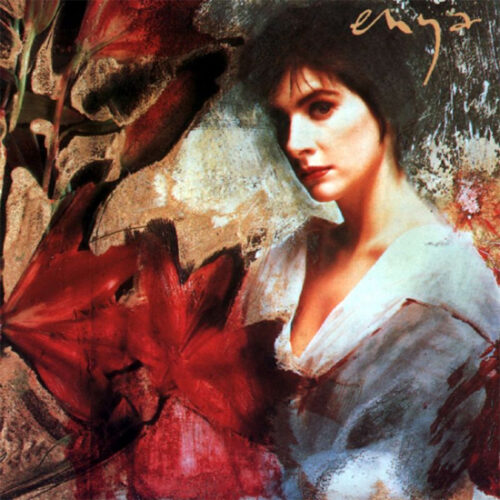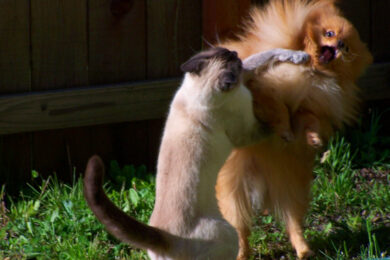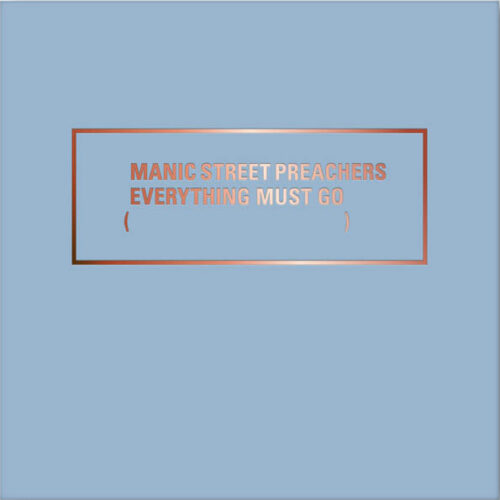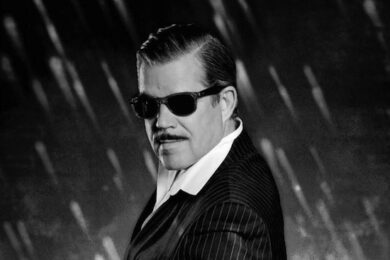There they are onstage. Again. After a decade. There’s fantastic filthy noise, mashed up beats and visceral vocals of pain and political confusion; a dash of hip hop and a lorryload of industrial noise. This is Atari Teenage Riot reclaiming their turf at London’s Electric Ballroom, playing one of their first shows for a decade.
Just when we needed them back, Atari Teenage Riot have suddenly re-emerged to set the benchmark for noise/annoys freaks.
The Berlin based band emerged in 1992 as a politically charged crew on a mission. I first interviewed them at that time, round the corner from the Roundhouse in some long lost studio where they were recording a version of Sham 69’s ‘If the Kids Are United’. They were gangling German youths, beautifully political; almost a last stand for fierce idealism in the post-E daze. They stumbled out of the squat and street riot culture of Kreuzberg and were determined to fight back against the bad guys, both musically and physically.
All these years later, they’ve been through the mill. They fought the Nazis, they made records that were benchmarks in extreme sound and they played meltdown gigs before falling apart in 2000 and then losing rapper and MC Carl Crack to drugs a year later.
Meanwhile, mainman Alec Empire released a whole heap of great noise records on his Digital Hardcore label, launched a solo career and watched as his ATR blueprint became, arguably, the escape route for techno into neo-bands crossing the techno beats with rock dynamics. Groups as diverse as the Prodigy and even Rammstein copped a feel of this noise hard-on that ATR pioneered.
After the ATR meltdown in 2000, noiseniks thought that they had seen the last of the band who mashed together idealism, dirty beats, Kreuzberg squat culture, punk and techno. Then, a few months ago, a series of shows were announced – a timely reaffirmation in the middle of the new world order of recession and increasing tension that created the perfect backdrop for this angular anger.
Backstage at the Electric Ballroom, the ever-affable, intelligent and well-spoken Alec Empire is taking stock of his bands position in the scheme of things.
"We never stopped officially but we didn’t see the point in continuing when Carl died," he says. "Already the band was due for a break. We did that show [at] Brixton Academy with Nine Inch Nails in 1999 and we did that noise thing which was like a full stop on that period of the band. Hanin Elias walked out of the band, then Carl Crack, Nic Endo and me were left to play a pure noise show in front of thousands of people.
"We were burnt out from all the touring and after the third album came out, we had already decided to take a break. We started recording the album on the day of the 9/11 attacks and when it was finished Carl died, and we didn’t feel like doing the stuff anymore."
Alec Empire went off to pursue production and a less extreme solo career. A decade later, he has reunited with German/Japanese noise artist Nic Endo and new MC CX KiDTRONiK to perform new shows as ATR. So far, they’ve received rave reviews and been welcomed by big houses of newly adrenalised noise youth.
Alec says: "We just wanted to do the shows for fun. Some people think its some kind of master plan, but there is no plan like with the Pixies or someone like that. The feedback has been great and I didn’t expect that to be honest. It was suggested to do one show and then another.
"Everything came about because a few months ago, I recorded a song with our new ATR member CX KIDTRONIK for his upcoming album on Peanut Butter Wolf’s Stones Throw Label. They wanted to collaborate on a song and called me up and I sent them a loop to rap over. They said, ‘Great track but we really wanted a 200 BPM thing’, which was a surprise as rappers usually want slower things. The track suddenly went into a real digital hardcore direction, and when we got Nic Endo in to do some Riot Grrrl vocals, it was kina obvious where I was going next."
Atari Teenage Riot don’t operate on the showbiz principal, so terms like ‘reformation’ and ‘reunion’ don’t feature in their lexicon.
"People are calling it a reunion but I don’t really see it like that," he says. "I see it as more of an upgrade, because we looked at the old songs differently as we were putting them together again – especially the early songs which had to be from a different perspective, because Carl was then doing the lyrics about racism in Berlin in 1992. CX KiDTRONiK said, ‘What do you think about re-writing the parts?’, and said it would be good to write about America and the Obama administration. Kidtronik used to be part of Nation Of Islam at one time and was into Public Enemy and all those kinds of people, and I thought that’s great, let’s write about the now and all these politicians and bring that to ATR."
ATR 2010 – with Kidtronik part of the line up along with Alec and Nik – are still wary of the powers that be. Even the so called good guys…
"With politicians you don’t ever really know if they are puppets of international corporations. I think Obama has such a good image. Everybody knows his image and no-one questions his image and I thought that’s a good thing to discuss in ATR. I also know a lot of people just close their eyes now and think, well that’s all taken care of, it’s great, Bush is over and they don’t see the negative stuff. People see a smiling face and think its all ok. The challenge is how do people react now?"
In contrast, ATR have reacted in the only way they know how: by hitting the ground running.
He says: "We played this show in Amsterdam and it was insane. Usually when I go and see other bands that have reformed, I’m missing that hunger and stuff, but the moshpit was wild and our music felt almost very up to date with what’s going on – even if some of the stuff was written 10 years ago. When we wrote it at the time it was almost like a nightmare, because we looked at what could happen in terms of German history and East Germany. We also looked at the out of control technologies which are now all over the place, like the cameras at airport and stuff in passports, and it seems like people can relate to us now and what we are saying when maybe they didn’t 15 years ago."
Typically of any band that glimpses the future, ATR are faced with the danger of the very same future catching up with them.
"Technology has moved on and we combine the new stuff with the old stuff. For instance, we did this new track called ‘Activate’ and put it on the internet. The idea was that we used original equipments like my drum machine, old sampler, bassline distortion pedal and the Atari computer sequencing the whole thing. It was liberating because it was such so stripped down… It almost reminded me maybe how people must have felt with punk when it went back to basic rock & roll and not using all these keyboards like in prog – not that I was there or anything! Before, I always wanted to break through those limits and any time anything new came along I wanted to use it. And now what we have is ATR with the raw energy. Other electronic stuff is too over-produced. What is the future? There is no sense of time any more; someone was saying that Atari Teenage Riot has that sort of sound like Slayer and the Ramones – the sort of bands that you don’t want to sound modern – they just have their own sound. I understood the point he was making. If I want to do a different style I do it outside ATR, like on my last solo record where I wanted to do analogue stuff like in the 80s – almost new wave with synths which you can’t fuck with so much. At that point, I wanted to get away from the almost digital distortion kind of stuff."
ATR arrived in the early 80s with the shock of the new. Since then, their sound has either been a key influence or a catalyst for all kinds of digital aggro, with bands like the Prodigy gatecrashing the mainstream with a similar sort of punk-techno fusion. Frustrating?
"The English always protect their own," he laughs. "The Prodigy, for me, are quite different from us. They would never say stuff like we did in our songs. I remember when we put out the Future Of War album and the German authorities were not happy about a lyric on the album – ‘Cut all policemen to pieces’ – and I remember arguing about that line being a more artistic kind of thing [laughs]. The Prodigy would not do that kind of thing. Part of ATR presses buttons to provoke people, whereas the Prodigy came out of the rave context which was about uniting people and they would never want to piss people off. That was a different place than where were came from.
"Our first record had the Red Army Faction logo, with the Kalashnikov and star, and if you do something like this you are asking for trouble in Germany. Now it’s even more provocative – a lot of people on the left wing question the Red Army Faction – and I still get lot of shit for that, but terrorism back then in Germany was so different from what we understand as terrorism now. I think the Red Army Faction had this fear that the Third Reich would happen again, because after the war the Americans kept a lot of German Nazis as judges and high-ranking police officers. The old Nazis were running a lot of Germany in the 60s and the Red Army faction was a reaction to that. Their terrorism was in a totally different context to modern terror; it was if you can’t get any further by peaceful means or something, then you end up where they ended up. It’s an interesting discussion and these days when people say that change is necessary I think people should ask themselves beforehand where they are stood, because I have a feeling that the authorities and the cops won’t give in. Modern politics will lead to escalation in Germany. The banks get bailed out whilst in Kreuzberg a youth centre gets closed down which didn’t cost anything…"
Can Atari Teenage Riot be a threat in 2010…or, more pertinently, can any music still be a threat?
"A musician can never manipulate people 100 per cent but what they can do is trigger emotions. If you provoke people they think. I’m not sure if it can bring down the government, but I think music is very powerful and at some point translates into action. You can see it with books and art. A lot of people are disillusioned with music and think it’s stupid and doesn’t achieve anything. I disagree. Basically, I think it’s very important. Music can store emotions in recordings that decades later people can still understand – for example, in stuff like The Clash, if you hear their records decades later you still really feel something. And if you are that dumb that you don’t listen to lyrics, you could go to a demonstration and not understand that as well!"
The comeback tour sees Atari Teenage Riot welcomed back like legends. In their lifespan, they made a certain impact that defined the term cult band. Suddenly it seems as if music has caught up with them. What was once a wall of sound is now commonplace, and the once unusual idea of combining the brutal beats of techno and hip-hop with the distortion and passion of rock is now everywhere. What is it like to suddenly be accepted as returning heroes?
"An 18-year-old will say to me after a gig that they saw this great band from before they were born and that’s great," he says. "I was exactly the same with the punk stuff that I listened to as a kid that came out 10 years before I was born, but felt like half a century! People come up to me and say, ‘Hey! You did these raves with the free party collective, the Spiral Tribe in ’93 and they say ‘this was such a legendary time!’ which seems funny to me!"
Offstage Alec is calm, collected and genial, making his points with an eloquence that belies English being his second language. It’s hard to place him as the bare chested provocateur on the barricades of the stage. How does he psyche himself up for the ferocious intensity of his stage performance?
"For me, it’s the stuff I’m saying that makes me feel like that. Some people ask me how we have a good time before a show, and then get on stage and become totally different. But when I play I immediately remember what the priority is. I wouldn’t say this stuff and think of something else. With lyrics about the neo Nazis in Germany it’s just not that funny. You can’t joke about that that sort of stuff."
Empire grew up in Kreuzberg, the current epicentre of European bohemian cool on the edge of the centre of Berlin.
In the late 80s, the area was a mixture of Turkish immigrants and a fierce squat culture that was militantly politicised. After the wall came down, there was some gentrification and most of the squats were pushed away, but the area still retains a certain vibrancy and street style that marks it out as far different. Here, heavily tattooed hardcore freaks mix with wide-eyed techno heads, and the still huge local Turkish population continues to reside in an area that retains a certain flavour.
"Kreuzberg is different now from the squat days in the 80s. It nearly lost it. There was a time when the house prices went up and the yuppies moved in, but that slowed down because of the financial crisis. Did you hear about McDonalds opening up in Kreuzberg ten years ago? Up till then, Kreuzberg had been the one part of Berlin that they could not open in because they were scared of getting blown up or something [laughs]. But when they finally opened, everyone still went to the little Turkish café cross the street. MacDonald’s don’t care though. They keep trying to open up everywhere and crush the local culture; it’s part of their policy of clustering that Naomi Klein wrote about in No Logo.
"I compare that strategy with the Radiohead free download album. The way that the media, with the panic with all internet killing music stuff was all over the album. It seemed sacrilege to say anything against it. Almost like, please somebody help the dying music industry! any stupid thing will do to help the music industry and they clustered the stories about the Radiohead album."
The modern culture war, the internet and the death of the music industry are all the key talking points of the now. You can never guess any band’s stance on it. For Alec Empire, downloading is less about losing big bucks and more about the inevitable choke on upcoming young talent, many of whom will be throttled financially before they can get into their creative swing.
"To be honest, every time I think about downloading – especially when younger bands ask me – it’s hard to find an answer for everybody. On one level we thought, ‘Hey! This is exactly the right time for Atari Teenage Riot- we can get tracks straight out there!’. I remember when we recorded ‘Hunt Down And Kill The Nazis’ in 1992 we had the white label out about two weeks after the Rostock bombing, which was quite a statement when the big dinosaur rock machine took about three months to put on a big rock festival for the victims. Now, with the internet, we can react to these things much quicker, which is great.
"The great thing about Atari Teenage Riot is that we are so independent. We have done these things always ourselves. We don’t really need anybody… for example, we can record on our own and release on our own. We already have an audience and that makes downloading easy for us, but for younger bands to get to that level is far more difficult. People always think on the side of Pirate Bay and all that kind of stuff, when actually it’s a much more complex situation. It’s not right that Pirate Bay had all that advertising and made millions with this cool image with other people’s songs. In Berlin, rockers feel totally loyal to them and say that they are great people. People don’t know what they are downloading with all the damage to small groups, maybe some people will become more aware. I hope that will happen because at some point all the new innovative stuff will just stop!
"What I think is quite sad is I talk to young bands and they have such enthusiasm, but they need time to develop and then after a year or something a lot of them give up. They have to go back to their day jobs and it kills off a lot of exciting music."
When ATR started, Germany had a homegrown scene but was still dominated by foreign acts. On their return to the frontline their home country has a huge home grown rock scene with bands like Rammstein filling stadiums worldwide.
"I’ve know them from a long time ago when they were an East German punk band called Feeling B," says Alec, "and I knew that they were not Nazis even though there was this stupid discussion. People can never see beyond things. Always misunderstand."
Germany has a great musical history that enjoys working at the extremes. If Rammstein have made great capital out of excagerating the cliché of Germanic culture into something that idiots mix up with being Nazis then they have made their point. ATR’s fierce noise assault has often been dumped in with industrial music, but Empire feels closer to the 70s Krautrock of Neu! and Faust. German rock has a very interesting history and its relationship to rock & roll arrival still affects the mentality of its creators to this day.
"Rock & roll was brought to Germany by soldiers after war, and I think the weird relationship between Germans and pop and rock music comes from that time and that context.
"Also, in England, independent or underground music has always been closer to the mainstream, whilst in Germany the major companies put the stuff on the platform for everyone to swallow. A good example of this is in Berlin, where what is very hot in a club never makes it into the mainstream at all."
One key strand in the band is Nic Endo’s presence and vocals. Her powerful screams and no bullshit stage style are a major part of the band. She is the perfect foil to Alec Empire, and one of a whole clutch of woman who were involved in the Digital Hardcore scene. It’s not surprising that Empire himself is a huge fan of the Riot Grrrl scene and is ready to champion any women in rock who try and take their own path.
"It’s no secret that I used to love X Ray Spex. I always loved female vocals. I love the screaming – it’s very energetic, a key frequency. To me, women are very important in punk rock. If you interviewed me when I was 14 I would have said that Poly Styrene is my favourite singer, then there would be a long gap till Riot Grrrl in the early 90s, which was just great. A lot of men are scared of stronger woman and I find that boring. Like when conservatives see their daughters and wives as passive stand-in- the-kitchen types. To be honest, in the George Bush era, a lot of this very outdated stuff came back like in pop music. There was some female singer who won the Grammy and she was saying thank you to the record label for allowing me to include one of my songs on the album. This is so horrible to me.
"Riot Grrrl was not that big in Germany. Germany has this very conservative view of the woman’s role. A good example of this is Kate Moss being big in the UK – I wouldn’t say that Kate Moss has anything to do with riot girls but she is so different from Heidi Klum in Germany. German woman are always very controlled and a bit more conservative."
On their return, ATR have noticed that the techno scene itself has vastly changed. There are new styles in town, new ways and new rhythms in the digital world. Where does Alec stand on forms like Dubstep?
"A few months ago I got this message from the publisher saying, ‘Hey I got this 12" with samples of ATR all over it’ and it was a really cool dubstep kind of thing with a lot of Atari samples, so I emailed the guy and said, ‘Hey this has to be an official remix for ATR’. He was relived because he thought he had been caught! I thought what he had done was great, because I wanted to get some of that ATR energy into the dubstep stuff. With dubstep I like more of the angry stuff. Some of it is a bit flat, but some of the dubstep has such a great atmosphere to it. There was dub step scene couple of years ago in Germany – not sure how long that lasts. It was the latest thing for a bit. Germany has its own electronic scene which is very much defined."
ATR are very much part of this process. Electronic pioneers, they have not lost their edge. The series of recent gigs and the tantalising free download show that Empire and his droogs must return to the frey full time.
This is noise at its life-affirming and dramatised best.

